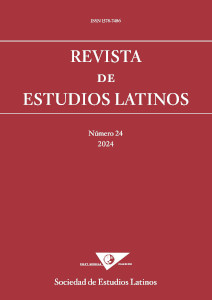Latin Prepositions in De ortographia of Parisio de Altedo: A Comparative Study
DOI:
https://doi.org/10.23808/rel.v24i.112172Keywords:
Medieval Latin, Medieval Latin orthography, Latin prepositions, Parisio de AltedoAbstract
The purpose of our research is to bring to light significant aspects of medieval Latin orthography. The specific objective of this work is to analyze the treatment of Latin prepositions from texts of late medieval orthography, previously studied and edited. The texts to which we refer are located in codex 5–4-32 of the Biblioteca Capitular Colombina de Sevilla and codex V. III. 10 of the Real Biblioteca de El Escorial. Specifically we will focus on part ix of codex V. III. 10, which contains the work of Parisio de Altedo, De orthographia, in order to elaborate a comparative study with the orthographic poem Versus ortographye, which occupies part iii of this codex, and with the texts De orthographia, Anonymous I and Egutionis de orthographia of codex 5–4-32. In the first case, we observe the coincidences and discrepancies in the treatment of the prepositions sub, ob, ab, abs, ad, am, cum, con, in, pro, re. In the second, we delve specifically into the prepositions e, ex, per, inter, pro, re, circum, iuxta. This analysis will endorse the validity of certain orthographic rules and will point out contributions to them.
Downloads
References
Albesa Pedrola, E. (2020): «La preposición latina IUXTA: un recorrido por textos peninsulares desde el siglo xi al xvii». Estudios de lingüística del español 42, 219–244. [26/05/2023] doi: ‹ https://doi.org/10.36950/elies.2020.42.8472 ›
Cecchini, E. (ed.) (2004): Vguccione da Pisa, Derivationes, Firenze, SISMEL-Edizioni del Galluzzo.
Cuadra García, F. (2009): «Los versos mnemotécnicos en los tratados de ortografía latina de la Baja Edad Media», CFC (L) 29/1, 129–151.
Cuadra García, F. (2010): «Versus ortographye: un poema anónimo de asunto ortográfico en época bajomedieval», en Luque, J.– Rincón, M.ª D.– Velázquez, I. (eds.), Dulces Camenae. Poética y poesía latina. Jaén-Granada, Universidad de Granada, 593–605.
Cuadra García, F. (2011): «Situación de la ortografía latina en España durante los siglos xii–xiii», en Martínez Gázquez, J.- de la Cruz, Ó. – Ferrero, C. (eds.), Estudios de latín medieval hispánico, Firenze, SISMEL-Edizioni del Galluzzo, 733–742.
Cuadra García, F. (2018): La ortografía latina en la Baja Edad Media: Estudio y edición crítica, Madrid, CSIC (Nueva Roma, vol. 47).
Cuadra García, F.– Conde Salazar, M. (2013): «Compilaciones medievales de contenido ortográfico», en Muñoz, M. J.– Cañizares, P.– Martín, C. (eds.), La compilación del saber en la Edad Media, Porto, Brepols, 161–180.
Desbordes, F. (1995): Concepciones sobre la escritura en la Antigüedad Romana, Barcelona, Gedisa.
Gutiérrez Galindo, M. A. (1993): Alejandro de Villadei, ’El Doctrinal’: Una gramática latina del Renacimiento del siglo xii, Madrid, Akal.
Jiménez Delgado, J. (1956): «La ortografía latina. Su problemática y su posible restauración», Helmántica 7, 22–24, 209–259.
Keil, H. (ed.) (1855–1880): Grammatici Latini i–viii, Leipzig, Teubner.
López de Ayala, M. J. (1994): Introducción a la ortografía latina, Madrid, Ediciones Clásicas (reimp.1991).
López de Ayala, M. J. (1998): «Los ortógrafos del renacimiento. Huellas de los gramáticos latinos, variaciones e innovaciones». Actas Congreso Internacional sobre Humanismo y Renacimiento, León, Universidad de León, 471–476.
Pérez Rodríguez, E. (1990): El Verbiginale: una gramática castellana del s. xiii. Valladolid, Secretariado de Publicaciones, Universidad de Valladolid.
Strecker, K. (1948): Introduction à l’étude du Latin Médiéval (trad. P. van de Woestijne), París, E. Droz (ed. or. Berlín, Weidmann, 1939).
Downloads
Published
How to Cite
Issue
Section
License
Copyright (c) 2024 Revista de Estudios Latinos

This work is licensed under a Creative Commons Attribution-NonCommercial-NoDerivatives 4.0 International License.
The originals published in the printed and electronic editions of this journal are the property of the Revista de Estudios Latinos and can be circulated as long as the original source and authorship is made clear in any reproduction, full or partial, of the same, and as long as this is not done for commercial purposes.






